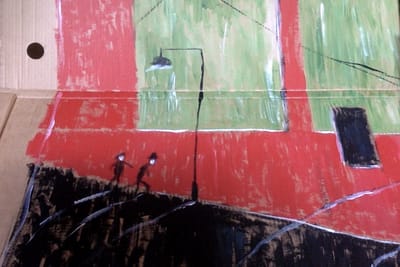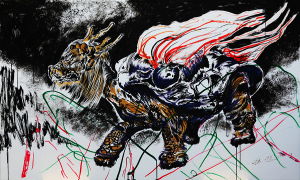Articles #End Times
I find Quine’s variant of naturalism fascinating because he is not particularly interested in these big, often very polarized, debates between naturalists and supernaturalists. Rather, he pretty much assumes that these debates have been settled and he seeks to advance our scientific worldview by showing that a truly naturalistic picture of reality also requires that we radically rethink our philosophical views about truth, justification, mind, reference, and meaning. In short, Quine argues that traditional philosophical disciplines like metaphysics, epistemology, and the philosophy of language need to be naturalized as well. Continuing the End Times series, Richard Marshall interviews Sander Verhaegh Published on: Dec 22, 2018 @ 09:12
Read More'Can God make a stone so heavy that he can’t lift it? If you say yes, there’s something God can’t do: he can’t lift the stone. If you say no, there’s something God can’t do: he can’t make the stone. So either way, there’s something God can’t do. Although Anselm doesn’t consider the paradox of the stone (as it’s called) specifically, he does have an answer. That God is omnipotent doesn’t mean that any sentence that starts out “God can” comes out true.' 'In addition to the paradox of the stone, there is the lesser-known paradox of the burrito, from The Simpsons: can Jesus Christ microwave a burrito so hot that he himself cannot eat it? My philosophy of religion students usually see quite quickly that there’s no real paradox here: according to orthodox Christology, Jesus is fully human, so of course the answer is yes.' Continuing the End Times series, Richard Marshall interviews Thomas Williams.
Read MoreI think there is a huge gap between the animals in Chinese people’s imagination and the animals in real life. In the zodiac portrayal, the 12 animals are living beings with feelings, personalities, intelligence and wisdom, but in the real life, the Chinese people have little positive things to say about the zodiac animals such as pigs, hens/roosters, mice/rats, monkeys, snakes and dogs, and most view them with distain and treat them as lifeless things. Continuing the End Times series, Richard Marshall interviews Deborah Cao.
Read MoreBesides order and necessity, Peirce also held, there is an irreducible spontaneous element in things, one that brings the cosmic process forward. This is the view called “tychism” (from the Greek tyche, chance). Ward goes further than Peirce in that he identifies this irreducible spontaneous element with what we are used to call “freedom of the will”. But to the best of my knowledge, he never subjected this notion to any serious scrutiny. Continuing the End Times series, Richard Marshall interviews Pierfrancesco Basile.
Read MoreMeir Dan-Cohen is a hard-core Harvard-tough philosopher of law. He has written the books Rights, Persons and Organisations: A legal Theory for Bureaucratic Society and Harmful Thoughts: Essays on Law, Self, and Morality. He is inspired by Kant’s Kingdom of Ends, and thinks that the ideas that we create create us. He thinks legal positivism is a bad thing and dignity better than autonomy. His armchair is definitely not burning. Continuing the End Times series, Richard Marshall interviews Meir Dan-Cohen
Read MoreLisa Bortolotti introduced the concept of epistemic innocence to encapsulate the idea that certain intuitively suboptimal cognitive processes—like delusions, biases, and so on—can have surprisingly complex epistemic profiles. It’s not a new idea that epistemically bad cognitions can have psychological benefits; ignorance can be bliss. The new and interesting idea is that sometimes these ‘imperfect cognitions’ can also have significant, unique epistemic benefits. Continuing the End Times series, Richard Marshall and Lindsay Jordan interview Chris Letheby.
Read More
